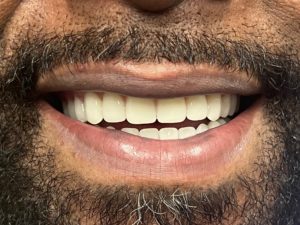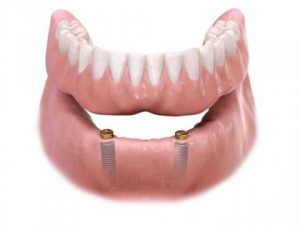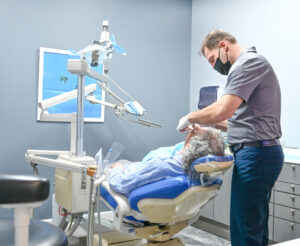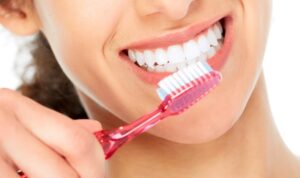
Seeking dentures that look natural is a common concern. Here, we offer insight into dentures that mimic real teeth with convincing realism, from materials to fit. Without spoiling the forthcoming rich detail, this article stands as your concise guide to confidence in your smile.
Key Takeaways
- There are various types of dentures – traditional full dentures, implant-supported dentures, and partial dentures – to meet different needs, and modern dentistry focuses on natural appearance and comfort.
- Realistic dentures require a precise fit, use of high-quality materials like porcelain and composite, and attention to aesthetics such as color matching, with technology like 3D printing playing a key role in the customization process.
- Proper care, including a daily cleaning routine and regular dental check-ups, is essential to maintain the natural look and functionality of dentures, while choosing a skilled dentist and balancing cost with quality is crucial for the best outcomes.
Exploring Denture Varieties for a Natural Smile
Dentures are no longer about simply replacing missing teeth. Today, they are designed to restore the authenticity of your smile and boost your confidence after having teeth extracted. Thanks to modern dentistry, various types of dentures are available, each offering a realistic and natural tooth appearance.
In general, denture options fall into three categories: traditional full dentures, implant-supported dentures, and partial dentures. Each of these options caters to different needs and preferences, and understanding them can help you make an informed decision about your oral health.
Traditional Full Dentures
Traditional full dentures provide a solution for individuals who have lost all their teeth in an arch. These dentures are designed with a flesh-colored acrylic base to imitate natural gums, combined with artificial teeth that are carefully selected to resemble the shape, color, and size of natural teeth.
Achieving a natural appearance with traditional full dentures requires meticulous design and customization. These most natural looking dentures are custom-fitted to the contours of an individual’s gums and are shaped to be compatible with the anatomy of the jawbone, providing a snug fit on the gums.
While traditional full dentures are cost-effective, their successful implementation relies heavily on utilizing materials like acrylic resin for a natural look.
Implant-Supported Dentures
Implant-supported dentures offer a more secure and stable foundation compared to their traditional counterparts. These dentures are anchored to dental implants surgically placed in the jawbone, offering a solution that closely mimics the appearance and function of natural teeth.
The benefits of implant-supported dentures include:
- Stability, preventing slipping or moving
- A natural look and comfortable function
- Stimulation of the jawbone, protecting against bone loss
- Replication of the function of natural teeth roots more closely than traditional dentures.
Partial Dentures
Partial dentures are a great solution to replace missing teeth for individuals with some remaining natural teeth. They fill in gaps with plastic bases and replacement teeth for a natural look.
Partial dentures can be either removable with a metal framework that clips onto existing teeth or fixed via bridges cemented adjacent to the gap. Their design allows them to blend seamlessly with existing teeth, filling in gaps and maintaining alignment for a cohesive appearance. Achieving a natural-looking option for partial dentures requires that they complement existing teeth in color and shape.
The Hallmarks of Realistic Dentures
Creating realistic dentures is a blend of art and science. With advancements such as 3D printing in dental technology, dentures can now be designed to provide a more lifelike appearance.
The hallmarks of realistic dentures include:
- Selection of materials that mimic natural gum texture and tooth enamel
- Custom fitting to the individual’s gum line
- Color matching to achieve a natural look
These aspects not only enhance the wearer’s self-esteem by significantly improving the natural appearance of their smile but also ensure the dentures’ functionality over time.
Material Excellence
The materials used in dentures play a vital role in their overall comfort, appearance, and durability. Porcelain teeth, for instance, are often preferred for their natural look due to their translucent quality, closely resembling that of tooth enamel.
Composite materials offer a balance of strength and aesthetics, resisting wear and staining while providing a lifelike appearance. Acrylic resin, on the other hand, is particularly favored for its ability to be adapted to match the natural contours of the gum line.
Modern dentures typically employ a blend of materials, including:
- a combination of acrylic resin and metal for structure
- acrylic resin or porcelain for the teeth
- pink-colored acrylic for the base to resemble natural gums.
Precision Fit
A precise fit is crucial for comfort and a natural look. Customization of dentures ensures they align perfectly with an individual’s gum line and existing teeth. Achieving this precise fit includes matching the denture’s base to the natural color of the gums for a seamless appearance.
Technological advances like 3D printing have allowed for the production of denture bases and teeth with precise, balanced properties for optimal fit, function, and comfort. It is important to address loose dentures promptly to prevent them from slipping and causing discomfort, as this can affect their appearance and functionality. Regular maintenance and adjustments can help ensure a comfortable and natural fit.
Lifelike Aesthetics
Beyond fit and material, the aesthetics of dentures play a significant role in how natural they appear. Modern dentures are designed to closely mimic real teeth in terms of color, shape, and size, with customizations tailored to each person’s unique characteristics for a natural appearance.
The selection of the correct tooth shape and shade is vital to match the individual’s age and facial features, ensuring the dentures appear natural within the context of their overall appearance. Dentists consider a variety of factors, including the patient’s facial features, remaining natural teeth, and personal aesthetic desires when selecting the most appropriate prosthetic teeth for the dentures.
Achieving Comfort Alongside Natural Appearance
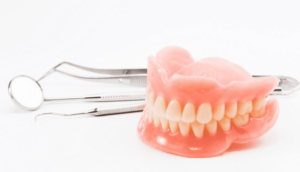
However, it’s also essential to avoid ill-fitting dentures, which can cause discomfort and even lead to irritation and infection. Dentists may recommend relining loose-fitting dentures or replacing them if relining does not solve the issue.
Unfortunately, choosing low-cost dentures may lead to an aged appearance, further tooth loss, jaw fractures, and increased risk of gum disease due to bone loss. These lower quality dentures may reduce quality of life by causing discomfort, difficulty in maintaining a healthy diet, speech issues, and constant gum irritation.
Secure Fit and Functionality
A secure fit and functionality are achieved through advanced technology and precise customization. Implant-supported dentures enhance stability and function over traditional dentures and help maintain facial structure by preventing bone loss.
Advanced technologies like 3D printing and CAD/CAM play a crucial role in the manufacturing of dentures, contributing to detailed, individualized fit, and a more natural aesthetic. Moreover, the design of dentures takes into consideration the need to fit comfortably over the gums and adjust to mouth and facial movements, providing a secure fit that facilitates natural speech and eating.
Durability Meets Design
In denture design, durability and aesthetics go hand in hand. High impact denture base materials are vital for withstanding the stresses of daily usage, including chewing, and for maintaining tooth stability within the denture. An effective balance between fracture toughness and flexural strength/modulus in denture materials ensures comfortable wear and minimizes the risk of damage from accidental drops or impacts.
Moreover, wear resistance in denture teeth is crucial for preserving the prosthetic’s appearance and the functional integrity of the biting surfaces over time. Customized cosmetic dentures offer functional benefits, a naturally superior appearance, and an improved fit compared to traditional dentures.
Choosing the Right Dentist for Your Needs
Choosing the right dentist for your denture needs is as important as choosing the right denture. A dentist specialized in dental prosthetics is essential for custom, realistic dentures and a perfect fit.
It’s important to verify a dentist’s reputation and query their experience with dentures, including:
- Viewing before-and-after photos of their work
- Ensuring they offer both technical skill and personalized care
- Effective communication to ensure comfort and clarity in expectations and outcomes
Expertise in Prosthetic Dentistry
Prosthodontists are professionals who specialize in prosthetic dentistry, undergoing an additional 3-4 years of postgraduate training in the field, certified by the American Dental Association to ensure expertise in creating dental prosthetics that look natural.
During a prosthodontist consultation, patients receive a thorough assessment for dental prosthetics such as implants, crowns, and bridges, facilitating a custom-fit and natural appearance for their dentures.
Equipped to handle complex dental conditions, prosthodontists are capable of providing comprehensive, long-term oral health care plans, which are pivotal for maintaining the integrity and aesthetics of prosthetic dentistry solutions.
Comprehensive Consultation Process
The initial consultation is a critical step in the denture process. During this stage, a dentist assesses oral health conditions such as bone density and gum health to customize the denture fitting.
The initial consultation process for dentures includes the following steps:
- Tailoring the consultation to focus on the patient’s specific needs and aesthetic preferences.
- Taking impressions of the patient’s mouth to ensure a precise fit.
- Taking measurements to ensure that the resulting dentures are custom-made for the patient.
These steps are crucial in creating dentures that are comfortable and provide a natural-looking smile.
Caring for Your Natural Looking Dentures
Once you have your perfect, natural looking dentures, it’s important to ensure they stay looking and functioning their best. Proper care and maintenance are crucial to maintaining a natural look and functionality over time.
Rinsing removable dentures after meals helps remove food particles and maintain cleanliness. Additionally, dentures should be handled carefully to avoid damaging the plastic or clasps when cleaning or removing them. After removing dentures, it is important to clean the mouth, gums, cheeks, and palate with soft brushes or gauze, including any remaining natural teeth.
Daily Cleaning Routine
Establishing a daily cleaning routine is essential for maintaining the aesthetics and health of your dentures. Dentures require daily gentle brushing with a non-abrasive cleanser and a soft-bristled brush to remove food, plaque, and deposits.
Most dentures should be soaked overnight in water or a mild soaking solution to maintain their shape. However, if you have partial dentures, they should be taken out before bed to allow the gums to rest. Remember, denture-soaking solutions can contain harmful chemicals, so it’s essential to rinse dentures thoroughly before placing them back in the mouth.
Regular Dental Check-Ups
In addition to a daily cleaning routine, regular dental check-ups are important for maintaining your dentures. Regular follow-up appointments are crucial for ensuring dentures continue to fit securely and comfortably, allowing for necessary adjustments over time.
Routine dental visits should include denture inspections and professional cleanings to maintain optimal oral health and denture function. Remember, your dentist is your partner in maintaining your smile, so don’t hesitate to schedule regular visits.
Navigating Cost and Quality for Dentures
When choosing dentures, it’s important to consider both cost and quality. The cost of dentures can vary based on:
- The materials used
- The design
- The fabrication process
- The number of teeth being replaced
- How the dentures will be secured.
However, it is crucial to not compromise on the quality of dental care when considering the cost of dentures. Exploring payment plans or insurance coverage can help manage these expenses. Remember, your smile is an investment in your confidence and health, and it’s worth every penny.
Summary
In conclusion, selecting the best natural looking dentures involves considering various factors, from the type of dentures to the material used, the fit, and the dentist’s expertise. Proper care and maintenance, along with regular dental check-ups, are also essential to maintain the dentures’ natural look and functionality. Remember, a radiant smile is more than aesthetics; it’s about restoring confidence and improving overall oral health. So take the time to explore your denture options and make the decision that best suits your needs and preferences.
Frequently Asked Questions
What are the different types of dentures?
The different types of dentures are traditional full dentures, implant-supported dentures, and partial dentures. Each type serves different needs and offers unique benefits.
How can I ensure my dentures look natural?
To ensure your dentures look natural, focus on choosing the right material, ensuring a precise fit, and prioritizing lifelike aesthetics. This will help you achieve a natural-looking smile.
How do I care for my dentures daily?
To care for your dentures daily, gently brush them with a non-abrasive cleanser and a soft-bristled brush, and soak them overnight in water or a mild solution to maintain their shape. Regular care helps to keep your dentures in good condition.
What should I consider when choosing a dentist for dentures?
Consider the dentist’s expertise in prosthetic dentistry, reputation, patient care approach, and consultation process when choosing a dentist for dentures. These factors will ensure you receive the best possible care and outcome.
How do I balance cost and quality when choosing dentures?
When choosing dentures, prioritize quality over cost, and consider exploring payment plans or insurance coverage to manage expenses while maintaining dental care.

